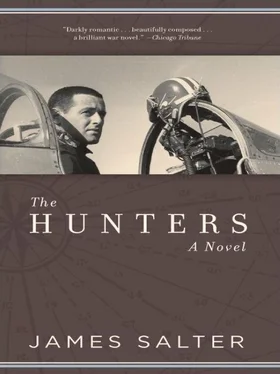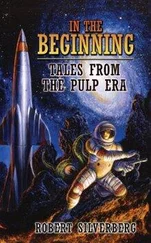He moved toward the bar and, seeing Cleve, stood beside him.
“What do they have you doing now, Cleve?” he asked.
“I took over a flight today.”
“Damned good. How many missions have you got in?”
“Eight.”
“It takes a few to get the idea,” Imil confided, “but they tell me you’re way ahead.”
“I’ve only been in one fight.”
“That has a lot to do with who you’re flying with, but you’ll be leading from now on. There’ll be plenty of fights. All a man has to do is want to find them. You know what I’m talking about. That’s all it takes. Christ, Cleve, we were flying together when all a fighter pilot ever had for breakfast was a cigarette, a cup of coffee, and a puke. You know what I mean. Now I have operations officers, for Christ’s sake, and even a squadron commander, who don’t have a MIG between them. Fighter pilots! But I’ll take care of the real ones, Cleve. Good care. I always have, haven’t I?”
One way or another, Cleve thought.
“You’ll be getting that first kill,” Imil said, pushing his glass across the bar for a drink. “It won’t be long.”
“I hope not.”
“Don’t worry. The desire, Cleve, that’s all it takes.”
More and more people were coming into the club as the riot of discordant song carried to the nearby barracks and the mess. They began to sit together by squadrons and to compete for volume, sometimes with two or three different songs going at the same time. Two of the squadron commanders were present, and the third had been summoned by telephone. A full drinking and singing bout was beginning.
“This is fine,” Daughters muttered. “We haven’t had anything like this since at least the night before last.”
“Shut up and sing,” DeLeo said, “or Imil will ground us all.”
A chapping wind with a metallic tone to it was blowing. Excitement was present but subdued. At 1215 they rode down under the canvas of a truck lurching from every pothole. There was not much talking. The viscosity of the blood, Cleve thought, is changed. It actually seemed to be thinner.
There were coughs at the briefing and a constant shifting of feet. A pointer moved about the map, tapping the important locations, and every last detail of the mission down to the password at the front line was covered. The weather officer made wisecracks about the poor conditions up north. They filed out like men going to be inoculated.
“It’ll be scrubbed,” Daughters said.
Cleve agreed.
“I wouldn’t be surprised,” he said. “I think it’s going to snow.”
The sky looked gray and depressing. Hunter and Pettibone listened unhappily.
“But we’ve had the briefing,” Hunter suggested.
“They’ll scrub it, and we’ll brief again,” Daughters said. “It’s all taken into consideration.”
“What do you mean?”
“It’s a hundred missions or a thousand briefings, whichever you get first.”
At 1300 they were waiting in the locker room, the equipment hanging on them, loose and unzipped. Daughters was cleaning the inside of his oxygen mask with a handkerchief. Hunter and Pettibone sat together on one of the benches.
“What was that minimum fuel again? I swear I can’t remember.”
“Fifteen hundred pounds,” Pettibone said.
“That’s right. I keep forgetting. They certainly have a lot of figures for you.” He glanced at Cleve and laughed apologetically.
“God, don’t they?” Pettibone said.
“They didn’t tell you the most important thing,” Cleve said.
“What’s that, sir?”
“Just get on my wing and stay there.”
At 1325 they were in their ships, waiting. The minutes flickered by slowly. At last the chill whine of the first engines being started came through the air. They were definitely going.
At 1400 they were far beyond all memory of earth, near the Yalu, among great floes of clouds. They flew in silence. It seemed as if the war was over as they moved through the gray, deserted skies. Shreds of cirrus hung in the air, like icicles along the edge of a roof. The quiet was more ominous than clamor. They flew a track where the river might be, but any position was an approximation. They were unable to see the ground. The fuel gauge was the only reality as its needle retreated slowly from full internal load: twenty-six hundred pounds… twenty-five hundred.
At 1450 they were nearing home. It had been very significant for Hunter and Pettibone, but Cleve had little sense of achievement. As he landed, there was nothing but the emptiness of a wasted mission. White condensation poured from the tailpipes like steam when they shut down their engines. Individually, they trudged in toward the warm buildings.
At the debriefing it was definite that nobody had contacted MIGs. The greatest anxiety went then. It was not so bad after all. The failure was communal, and a sense of comradeship began to return.
Cleve walked slowly back to the barracks in the late afternoon. It had been a strange, lonely mission. Hunter had done all right, holding good position most of the time, saying something only when it was necessary, and then with rare brevity; but Pettibone, Cleve thought uncomfortably, was a little weak. He was either lagging or shooting ahead. He didn’t seem to hear instructions. That was always a bad sign. Flying with him was like being responsible for a child in a crowd. He would require work and attention. He almost seemed to be in the wrong element, like a cat wading. Well, some developed more slowly than others.
The knob on the door to the room was loose. He had never been able to manage it with gloves on. He took the right one off and put his bare hand on the smooth, freezing brass. The door opened. He stepped gratefully from the cold into warm, shadowy comfort.
“Chung!” he called the houseboy
“He’s not here. I sent him out to get some blankets for me.”
It was a stranger, a second lieutenant sitting on the sixth cot, his bags already unpacked. He was sorting through a file of papers, apparently straightening them out. There were several sheafs spread beside him. He offered his hand without standing up, as Cleve approached.
“I’m Ed Pell,” he said, “but everybody calls me Doctor.”
It was the pale lieutenant from Tokyo, the pursuer of waitresses. There was no mistaking those eyes. They were like acid.
“Have you been assigned to this flight?”
“That’s what they tell me. How about you?”
“I’ve seen you before, haven’t I? At Fuchu.”
Pell regarded him closely.
“Maybe,” he said. “I don’t remember it though.” He glanced at Cleve’s name tag. “Connell?”
“Connell. I’m the flight commander.”
“Good deal,” Pell remarked calmly, rising to his feet.
It was all over him, the unfortunate wisdom of knowing enough to think he knew everything. Cleve could see that Pell was somewhat older than his fellows. It was to develop that he was twenty-five, and as free of idealism as a boy raised in the slums, although he actually came from open country in Michigan.
Cleve took off his winter flying jacket and then his pistol, lifting the harness from his shoulder and over his head. He tossed everything onto his cot.
“Just back from flying?” Pell inquired.
Cleve nodded.
“How did it go on the mission? Did you run into anything?”
“No.”
Cleve sat down in one of the chairs near the stove and removed his shoes. The leather had become chilled and hard. He warmed his feet, massaging them with his hands as he did.
“Not a thing, eh?” Pell said, shaking his head sympathetically. “Tom.”
“What?”
“Tom. You know, Captain, bad.”
Cleve nodded slightly. The idiom was new to him. After a few minutes he put his shoes on again. He picked up a towel and some soap and stepped outside to jog to the showers, which were in another building. In the steamy room where taps branched out of rows of pipes running along the ceiling, he stood for a long time under the hot, devouring water. Warmth began to reclaim him, from the outside in, with delicious languor. He stayed until the skin on the tips of his fingers grew soft and puckered. Then he dried and dressed himself in another room, where two stoves maintained a good, high temperature. He returned to the barracks. Pell was gone. In the club Desmond was sitting at the bar.
Читать дальше












